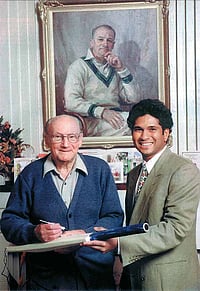Commentators are always annoying someone. After all, we think, how hard can it be? Such comfort. Such privilege. Any fool, we imagine, could do it. And over the years quite a few fools have.
Perhaps this is the most noteworthy aspect of the sidelining from IPL9 of Harsha Bhogle by the Board of Control for Cricket in India. Not that it has happened, but that Bhogle has survived so long unscathed.
Indian cricket tends to extremes of reaction, of adulation and execration. For twenty years and more, Bhogle has ridden these cycles out with lucrative success. He is nobody’s fool. He knows the game, the audience, the market. With honied words, tactful circumlocutions and the occasional craven apologetic, he has established himself in the suite of cricket brands.
A naturally affable and charming man, Bhogle has unobtrusively accommodated himself to the moods and methods of the powerful, not just those wielding administrative authority but those holding commercial clout – with a sports-lessons-for-business shtick (Winning Ways), he does a roaring trade as a corporate courtier.
Indian Cricket Inc, then, has made Harsha Bhogle. And right now, it appears, Indian Cricket Inc wants to remind him how much he owes.
Bhogle is bemused to have found himself outside the gilded circle, but is making the best of it. He is loyally watching from home, filing reems of copy, and experiencing a wave of public sympathy.
A popular take on the story is that he has found himself out of step with demands, from brittle players as well as bloviating patriots, for a more zealously partial coverage of cricket.
The trend is palpable enough, an analog of the exhibitionistic chauvinism of Indian politics and the grotesque pampering of its elites. But Bhogle was hardly flying a proud standard of impartiality in the first place.
The most conspicuous billboard advertisements at the World Cup a year ago, for example, were for an oil company who claimed to be ‘Taking All of India to the World Cup’.
‘They Have Pledged Their Support, It’s Your Turn Now!’ urged the slogan, personified by two great Indian cricketers oozing pride….and one famous Indian commentator clenching a gleeful fist.
The trouble with such cheerleading is that it is never enough. A cheer cannot be moderated, modified or qualified; it can certainly not be contradicted; it can only really be further amplified. Those accustomed to orchestrating a chorus of approval hear a mumble of demurral as a howl of apostacy.
Perhaps, in fact, such outcomes are inevitable. The television commentator has ever been a hybrid of critic and salesperson – the blurring of roles becomes even murkier for those, like Bhogle, employed directly by the promotor.
The BCCI is a market leader. The Indian cricket team is a product. They will brook not a speck of dissent. They want not analysis but advertising.
The BCCI, too, will shortly be putting broadcast rights for the IPL out to tender again. It is to be hawked, renewed and reinforced at every opportunity.
Inevitably, the world’s most powerful and opaque cricket organisation has kept its own counsel about Bhogle’s defenestration, which apparently took place at the eleventh hour, after the drawing up of rosters and of travel arrangements – all the better to keep its minions keen.
In Candide, inspired by the execution of the hapless John Byng, Voltaire made his famous remark about the English periodically hanging one of their admirals ‘pour encourager les autres’ – to encourage the others.
The BCCI might not be very good at winning friends. But it does have its ways of influencing people.






















